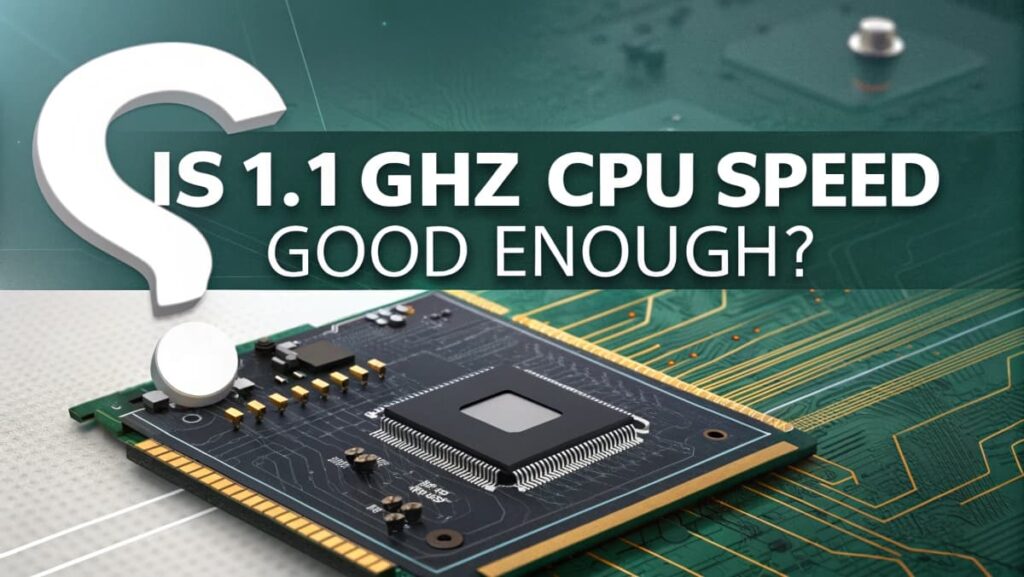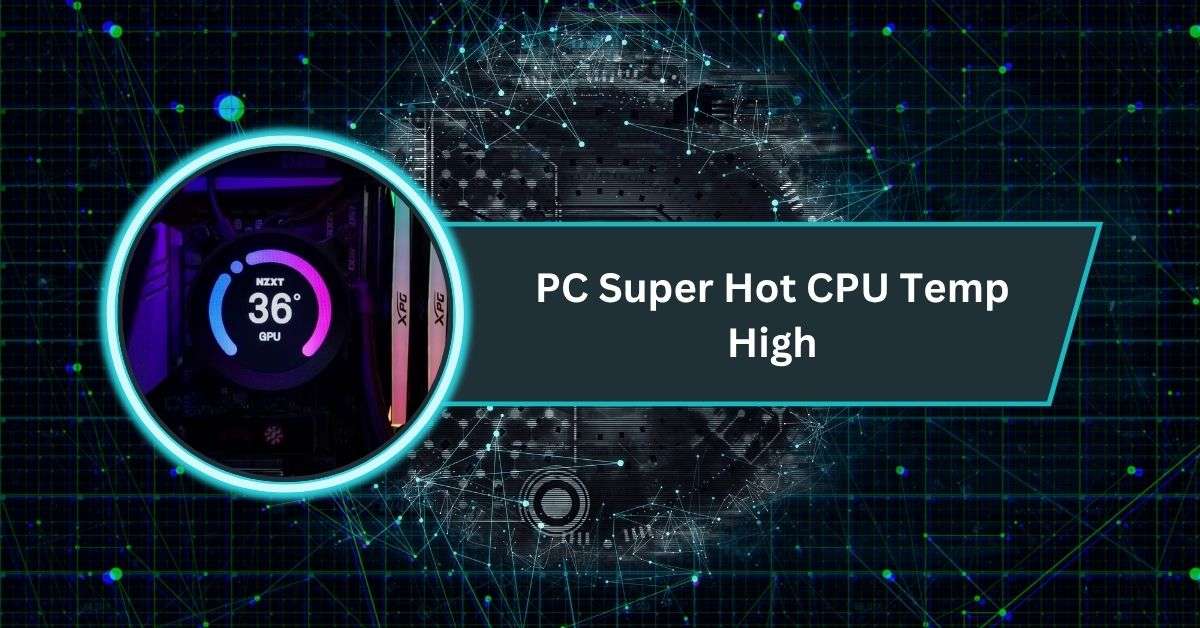When people look at the specifications of a computer, one of the first numbers they see is the processor speed, often written in GHz (gigahertz). A common question many users ask is whether a CPU speed of 1.1 GHz is enough to handle modern tasks in 2025.
A CPU speed of 1.1 GHz, like Intel Celeron models, means 1.1 billion cycles per second. Alone, GHz doesn’t show real power—cores, architecture, and efficiency matter more for actual performance.
This article breaks down what 1.1 GHz really means, how it compares to higher clock speeds, which processors run at this speed, and whether it’s a practical option in today’s computing world.
What Does CPU Speed 1.1 GHz Mean?
CPU speed is measured in gigahertz, which refers to how many cycles a processor can complete per second. A 1.1 GHz CPU completes about 1.1 billion cycles per second.
It’s important to know that this number usually refers to the base clock speed. Many processors also have a turbo or boost speed, which allows the chip to temporarily run faster when needed. For example, a CPU listed at 1.1 GHz might boost up to 2.4 GHz under heavy load, which gives better performance in short bursts.
So, the raw number doesn’t tell the full story. Performance depends on factors like the number of cores, the processor’s generation, architecture, and cache size in addition to GHz.
Is 1.1 GHz CPU Speed Good Enough?

Whether 1.1 GHz is “good” depends on your usage. For light tasks, such as browsing the web, streaming videos, writing documents, or checking emails, a processor at this speed can still manage. This is especially true if paired with sufficient RAM and a solid-state drive (SSD).
However, when it comes to demanding tasks, like video editing, 3D rendering, large spreadsheets, or modern gaming, a CPU with a base speed of 1.1 GHz will feel sluggish. You’ll likely face slow loading times, lags, and difficulty multitasking.
In short: 1.1 GHz is fine for casual, lightweight computing but not for performance-heavy work.
Examples of CPUs With 1.1 GHz Speed
Several entry-level processors run at or near 1.1 GHz. Some popular examples include:
- Intel Celeron N3350 – Base speed 1.10 GHz, dual-core processor designed for budget laptops. It can boost up to 2.4 GHz, but overall performance is still limited.
- Intel Celeron N4020 – Another dual-core CPU at 1.10 GHz. Often found in Chromebooks and low-cost laptops, suitable only for basic tasks.
According to benchmarks, these processors score very low compared to mid-range or high-end CPUs. On UserBenchmark, they fall in the bottom range of performance categories, showing they’re not designed for power users.
Also Read: How To Check CPU Temp: Proven Tips for Windows & Laptops!
1.1 GHz vs 2.0 GHz vs 3.0 GHz CPU Speeds
At first glance, it may seem like a processor at 2.0 GHz or 3.0 GHz is two or three times faster than a 1.1 GHz CPU. While that’s partly true in terms of raw cycles per second, modern performance isn’t just about clock speed.
For example:
- A 1.1 GHz processor with only 2 cores will struggle compared to a 2.5 GHz processor with 4 or 6 cores.
- Newer architectures (like Intel’s 12th or 13th gen CPUs) are more efficient per cycle than older chips, so even at similar GHz, the performance is much higher.
Still, in general use, you’ll definitely notice the difference. A 3.0 GHz processor will open apps faster, handle multitasking more smoothly, and provide much better overall responsiveness compared to a 1.1 GHz CPU.
Can a 1.1 GHz CPU Run Windows 10/11 Smoothly?
Microsoft lists the minimum requirements for Windows 10 and 11 as a 1 GHz processor with at least two cores. So, technically, a 1.1 GHz CPU meets this requirement.
However, “meeting requirements” doesn’t mean “running smoothly.” In practice, Windows 10 can run on such processors with limited multitasking. Windows 11, on the other hand, feels heavy and sluggish on 1.1 GHz chips, especially if paired with low RAM (4 GB or less).
Users often get better results by switching to lightweight Linux distributions or optimizing Windows by disabling unnecessary startup programs. Pairing the CPU with 8 GB of RAM and an SSD also improves usability, but performance will still be basic.
Best Uses for a 1.1 GHz CPU
A CPU running at 1.1 GHz is not completely useless. It has its place in certain scenarios:
- Basic web browsing and online shopping
- Email and word processing
- Streaming videos on YouTube or Netflix at standard resolutions
- Online learning platforms and productivity apps
- Lightweight Linux or Chrome OS devices
For students who only need a low-cost laptop for schoolwork or for people who want a simple device for casual use, a 1.1 GHz processor can get the job done.
Limitations of a 1.1 GHz CPU
While usable for simple activities, the limitations become clear when you ask more from it:
- Gaming – Even older or less demanding games will struggle.
- Video editing – Exporting or rendering is painfully slow.
- Multitasking – Running multiple apps at once leads to lag and stuttering.
- Large files – Spreadsheets, databases, and big documents load slowly.
These limitations make a 1.1 GHz processor unsuitable for professional work or entertainment beyond the basics.
How to Improve Performance on a 1.1 GHz CPU
If you’re stuck with a 1.1 GHz CPU, there are a few ways to make the experience better:
- Upgrade to an SSD if you’re still on a hard drive. This makes booting and app loading much faster.
- Add more RAM – At least 8 GB helps reduce system slowdowns.
- Optimize startup apps – Disable unnecessary background programs.
- Use lightweight software – Browsers like Firefox Lite or operating systems like Linux Mint can run more smoothly.
- Keep it cool – Overheating can cause throttling, which reduces speed even more.
These steps won’t transform it into a fast machine, but they can make it usable for everyday tasks.
Read Also: Baldur’s Gate 3 High CPU Usage – A Complete Guide In 2025
Should You Upgrade From a 1.1 GHz CPU?
If your usage is limited to web browsing, watching videos, or light office work, you can continue using a 1.1 GHz CPU. But if you need a smoother experience, multitasking ability, or any form of gaming, then an upgrade is a smart decision.
Modern processors, even in budget laptops, now start around 2.0–2.5 GHz base speeds with multiple cores and much better efficiency. They offer noticeable improvements in speed, battery life, and overall usability.
Cpu speed 1.1 GHz Windows 10
A CPU with 1.1 GHz can technically run Windows 10 since it meets the minimum requirement. However, performance is often slow, especially with limited RAM or HDD storage. Adding more RAM or an SSD can improve everyday use noticeably.
Is 1.1 GHz good for a laptop
A laptop with 1.1 GHz processor is fine for very basic work like browsing, streaming, and writing documents. It is not powerful enough for multitasking or heavy apps. For better speed, look for laptops with higher GHz processors.
Is 1.1 GHz processor speed good for school
For school tasks like typing, making slides, online classes, and browsing, a 1.1 GHz processor can manage. It’s okay if paired with at least 4–8 GB RAM. For smooth multitasking or projects, a faster processor is better.
1.1 GHz processor laptop
Laptops with 1.1 GHz processors, often Celeron models, are budget-friendly and lightweight. They work for simple needs like emails, notes, or browsing. But they struggle with gaming, design, or coding tasks. Choosing one depends on your personal requirements.
Is 1.1 GHz good for gaming
No, a 1.1 GHz processor is not good for gaming. Even lightweight or older games run poorly because the CPU lacks power. Gaming needs faster processors with more cores and higher clock speeds for a smooth experience.
Cpu speed 1.1 GHz laptop
A 1.1 GHz laptop usually has low-end hardware made for light work only. It’s okay for browsing, word processing, or videos. If you expect faster speeds, better multitasking, or gaming, consider laptops with higher GHz processors.
Cpu speed 1.1 GHz benchmark
Benchmarks show 1.1 GHz processors like Intel Celeron rank very low compared to modern CPUs. They score poorly in multitasking, speed, and gaming tests. These chips are designed for light computing only, not demanding tasks or professional software use.
FAQs
What is a good CPU GHz speed?
A good CPU speed is usually 2.5 to 3.5 GHz, which handles everyday tasks and gaming smoothly.
Is 1.1 GHz processor speed good for gaming?
No, 1.1 GHz is too slow for gaming. Modern games need faster processors with higher GHz and multiple cores.
Is a 1 GHz CPU good?
A 1 GHz CPU is outdated. It may run basic tasks but struggles with modern apps, multitasking, and operating systems.
Is a 1.1 GHz Celeron processor good?
A 1.1 GHz Celeron processor is fine for simple work like browsing or typing, but it’s weak for demanding tasks.
Can I increase my CPU speed?
Yes, some CPUs allow overclocking or turbo boost, but not all. Adding RAM and SSDs can improve speed overall.
Is 1.3 GHz processor speed good?
A 1.3 GHz CPU is better than 1.1 GHz but still slow. It’s only useful for light, everyday computing tasks.
What is a good RAM speed?
Good RAM speed is usually 3000 MHz or higher for desktops. Faster RAM helps with multitasking, gaming, and responsiveness.
Which CPU speed is better?
Higher GHz speeds are usually better, but cores and architecture also matter. A balanced CPU offers the best performance overall.
What is the fastest CPU by GHz?
Some CPUs reach over 5 GHz today. However, raw GHz alone doesn’t decide performance—architecture and core count are important.
Can CPU speed be too high?
Yes, very high speeds without cooling can cause overheating. Stability, temperature control, and power efficiency are more important factors.
Conclusion
A CPU speed of 1.1 GHz can still handle simple daily tasks like browsing, streaming, and light schoolwork, but it quickly reaches its limits with modern apps, multitasking, or gaming. While it technically meets requirements for Windows 10 and even Windows 11, the real performance often feels slow and restricted.
If your needs are basic and your budget is tight, a 1.1 GHz processor can serve the purpose when paired with enough RAM and an SSD. However, for smoother performance, long-term usability, or any demanding work, upgrading to a modern CPU with higher GHz and multiple cores is the smarter choice.
In short, 1.1 GHz processors are best for light computing, but they’re no match for today’s performance needs.











